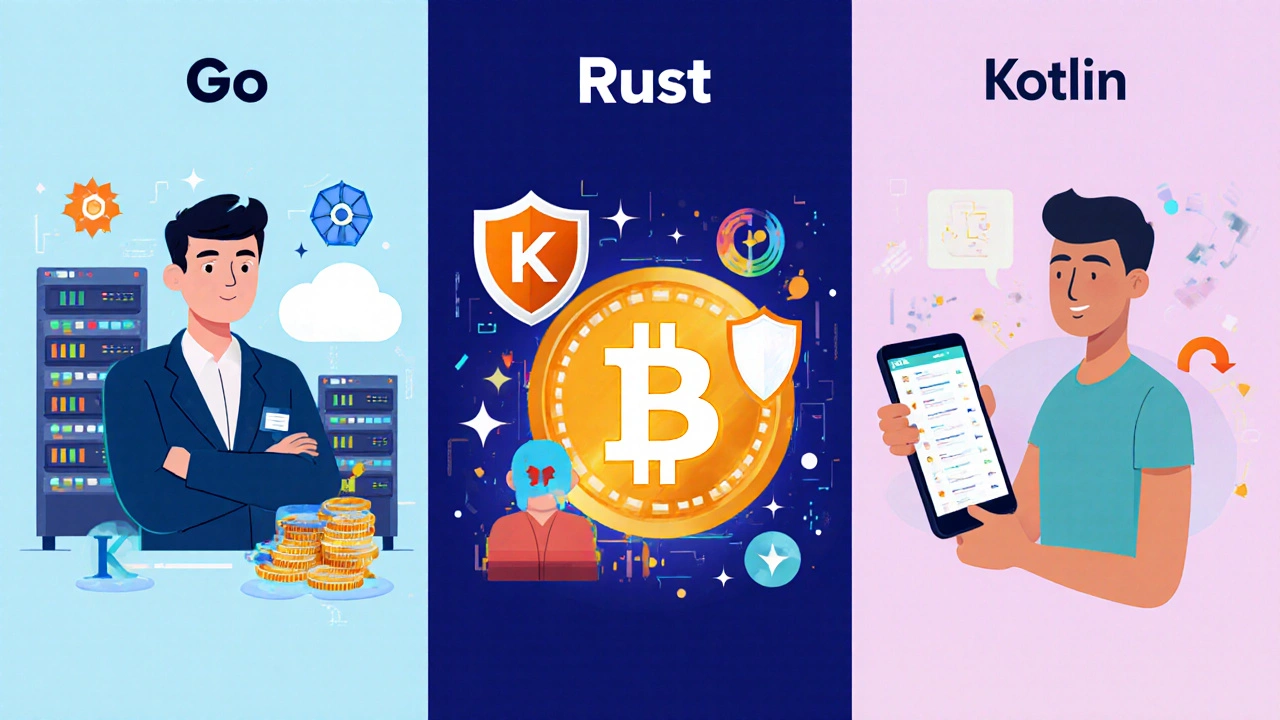Programming Salary Estimator
Estimated Annual Salary
When you hear the phrase Programming Language is a set of rules that lets developers write software, you probably picture code editors and debugging sessions. But the real question for most learners today is: which language translates into the biggest paycheck? Below we break down the data, the market forces, and the career moves that push certain languages into the top‑earning bracket.
Key Takeaways
- Go, Rust, and Kotlin consistently rank in the top three for average base salary in 2025.
- Specialized roles-like machine‑learning engineer or blockchain developer-add a 20‑30% premium to the language salary.
- Location still matters: US tech hubs pay 10‑20% more than European markets, but remote‑first companies narrow the gap.
- Investing in a language with strong library support (e.g., Python for data science) can boost earning potential through side projects and consulting.
- Continuous learning and certifications often yield a salary jump of £10k-£25k in the UK.
Let’s jump straight into the numbers. All figures are drawn from the 2024-2025 Stack Overflow Developer Survey, Hired.com salary reports, and the UK’s Tech Nation data set.
Why Salary Varies by Language
Three core factors drive pay differences:
- Demand vs. Supply: Languages that are in high demand but have a limited pool of proficient engineers command higher wages.
- Domain‑specific value: Some languages dominate lucrative niches-think Go in cloud infrastructure or Rust in systems security.
- Productivity & maintainability: Companies are willing to pay more for languages that reduce long‑term technical debt, even if the upfront learning curve is steep.
For example, the rise of container orchestration (Kubernetes) has pushed Go developers into the Go a statically typed compiled language created at Google sweet spot: high‑performance backend work with a relatively small talent pool.
Top Paying Languages in 2025
| Rank | Language | Average Base Salary (USD) | Typical Role | Key Industry |
|---|---|---|---|---|
| 1 | Go | $155,000 | Cloud Engineer, Site Reliability Engineer | FinTech, Cloud Services |
| 2 | Rust | $150,000 | Systems Engineer, Security Engineer | Blockchain, Embedded Systems |
| 3 | Kotlin | $148,000 | Android Developer, Backend Engineer | Mobile Apps, SaaS |
| 4 | Python | $144,000 | Data Scientist, Machine‑Learning Engineer | AI, Finance |
| 5 | JavaScript | $138,000 | Full‑Stack Developer, Front‑End Engineer | E‑Commerce, Media |
| 6 | C++ | $135,000 | Game Developer, High‑Performance Computing Engineer | Gaming, Simulation |
| 7 | Java | $130,000 | Enterprise Backend Engineer | Banking, Large Scale Services |
| 8 | Swift | $128,000 | iOS Developer | Mobile Apps, HealthTech |
These numbers reflect UnitedStates averages. In the United Kingdom, the same roles see salaries 10‑15% lower on average, but the ranking order stays the same.

Regional Influences on Pay
Location still matters, even with the remote‑first wave. In London, a Go engineer earns roughly £110k, while the same role in Birmingham is around £95k. The UnitedStates’ Silicon Valley premium reaches $180k for Rust engineers, whereas Austin, TX, offers $150k for the same skill set.
Remote‑only companies like Automattic and GitLab level the playing field: they publish salary bands based on experience rather than geography, allowing a developer in Birmingham to earn a US‑equivalent salary if they meet the skill criteria.
Specialized Roles That Add a Salary Premium
Choosing a language is only part of the puzzle. Pair it with a high‑value role, and the paycheck jumps considerably.
- Machine‑Learning Engineer (Python, Rust): +25% over the base language salary.
- Blockchain Developer (Rust, Go): +30% because of scarcity.
- DevOps / Site Reliability Engineer (Go, Python): +20% due to critical infrastructure responsibilities.
These roles also demand additional certifications-AWS Certified Solutions Architect, Google Cloud Professional Data Engineer, or Certified Kubernetes Administrator-each adding roughly £5k-£12k to the annual package.
How to Pick a Language for Maximum Earning Potential
Follow this simple decision tree:
- Identify your target industry (e.g., fintech, AI, mobile).
- Match the industry’s dominant language (Go for fintech, Python for AI, Kotlin for mobile).
- Check local job boards for demand‑vs‑supply ratios. A high demand/low supply score > 1.5 signals a salary premium.
- Invest in a recognized certification or a real‑world project that showcases mastery.
- Negotiate based on both language and role premium-don’t forget to bring up remote salary benchmarks.
For beginners, starting with Python is still a safe bet because its ecosystem unlocks data‑science side gigs that can supplement a full‑time salary.

Common Pitfalls and Misconceptions
Many aspiring developers think “the newest language equals the highest pay.” Not true. While Rust’s hype has driven salaries up, the learning curve is steep, and junior positions often pay less than an experienced Python data scientist.
Another myth: “You can switch languages and keep the same salary.” In reality, moving from a high‑pay niche (like Rust for blockchain) to a saturated market (JavaScript front‑end) often leads to a salary dip unless you also shift roles.
Next Steps: Build Skills That Pay
Here’s a practical three‑month plan for anyone aiming to break into a high‑pay language:
- Month1: Complete a project‑based online course in your chosen language (e.g., “Go for Cloud Engineers” on Coursera).
- Month2: Contribute to an open‑source repository that aligns with your target industry.
- Month3: Earn a role‑specific certification and update your LinkedIn profile with quantified achievements.
After you’ve built that foundation, start applying to roles that explicitly list the language in the job title and mention a salary band. Use salary calculators like Glassdoor or Payscale to set realistic expectations.
Frequently Asked Questions
Which language offers the highest entry‑level salary?
For entry‑level positions in 2025, Go and Rust lead the pack, averaging around $120k-$130k in the US. However, Python can edge them out in data‑science internships where bonuses are common.
Do remote jobs pay as much as on‑site roles?
Remote‑first companies increasingly publish US‑level salary bands, so a remote Go engineer in Birmingham can earn a comparable US salary if they meet the experience criteria.
Is it worth learning Rust if I’m a junior developer?
Rust’s steep learning curve means junior roles are limited. It’s better to master a more junior‑friendly language first (like Go or Python) and transition to Rust once you have solid systems experience.
How do certifications affect salary?
Certifications such as AWS Solutions Architect or Certified Kubernetes Administrator add roughly £5k-£12k to annual earnings in the UK and 5‑10% in the US, especially for cloud‑focused languages like Go.
Can I switch from JavaScript to a higher‑pay language without losing salary?
If you move into a role that values the new language (e.g., front‑end to back‑end using Node.js→Go), you can keep or increase your salary. Pure horizontal switches without a role change often result in a dip.

Write a comment